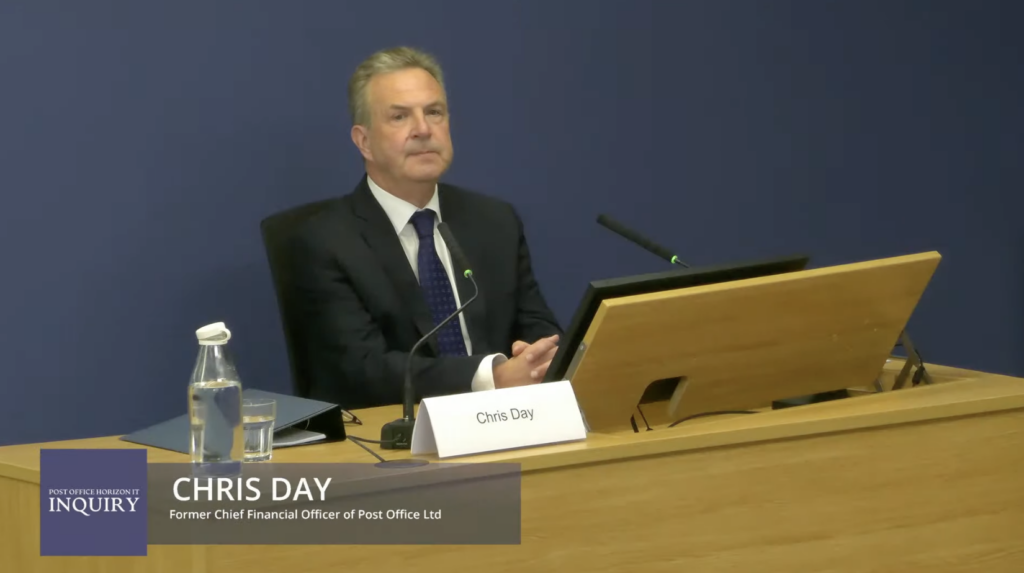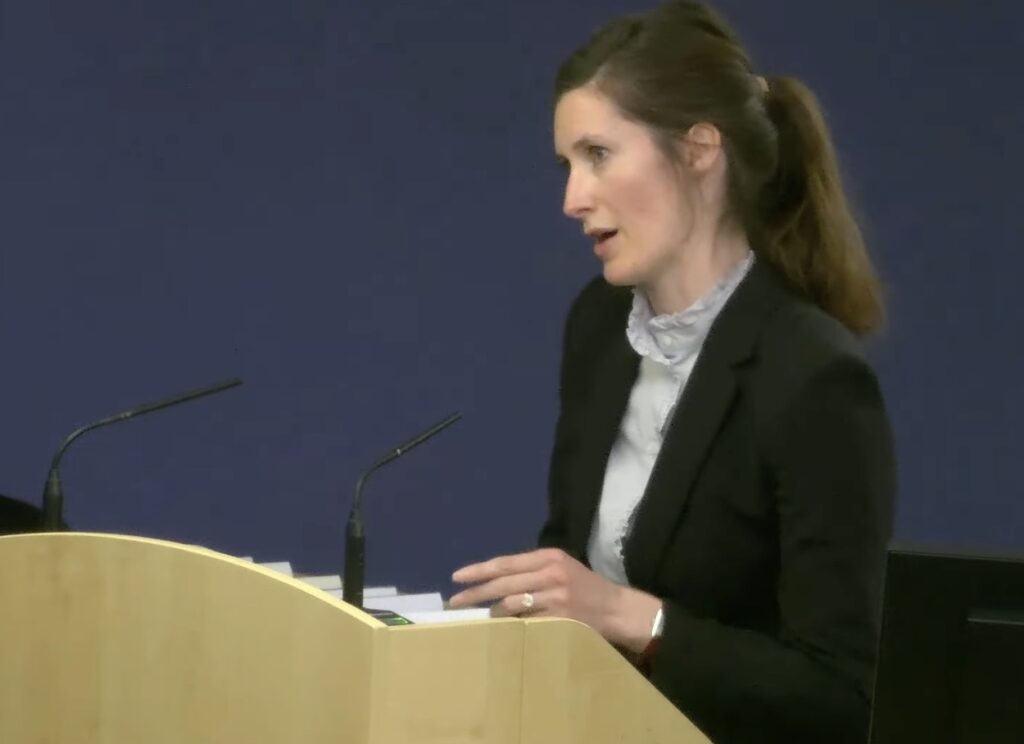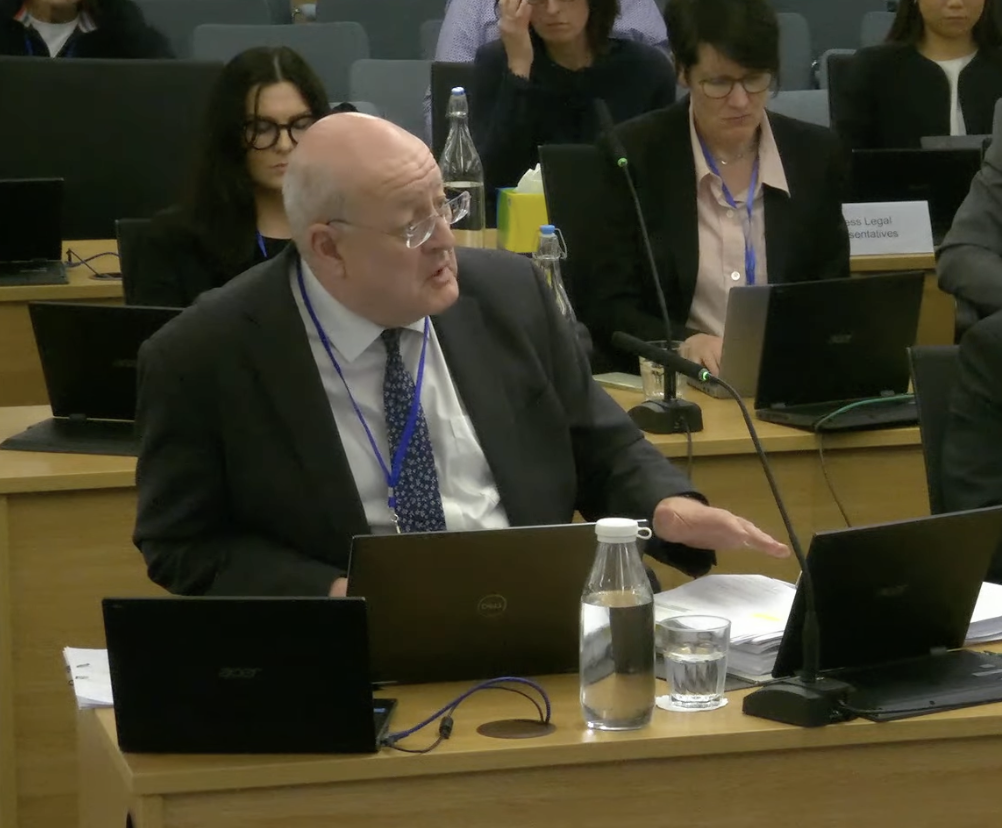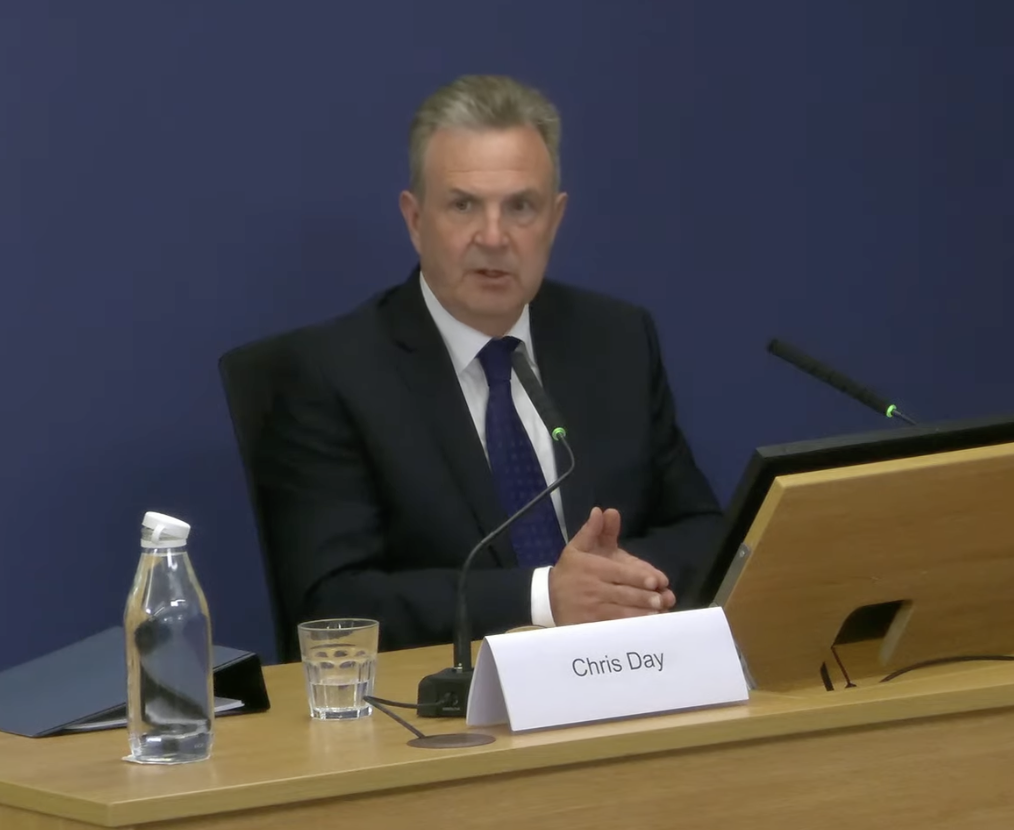
Chris Day, former Post Office Chief Financial Office had all the hallmarks of a low-wattage witness. He met that expectation square on. I think I was the only journalist present today. More fool me.
Taken at snail’s pace through multiple documents we’ve seen before, Day was unable to see the real risks in the Horizon system from the moment he joined in August 2011, to when he left in December 2014.
One of the first things to hit his desk was the Ismay report. Day was Rod Ismay’s boss. We have met Mr Ismay before.
Today Catriona Hodge, asking questions on behalf of the Inquiry, noted the Ismay report contained evidence about a number of software bugs, one of which had been affecting account balances in Post Office for years. Neither the Post Office nor Fujitsu (until that year) had properly diagnosed, let alone fixed it.
Hodge said: “Bearing in mind that this fault appears to have persisted for a period of five years, undiagnosed and unresolved in the Horizon system, would you have not entertained the possibility that there would be affected branches where accounting errors hadn’t been detected and adequately resolved?”

Day replied: “I viewed this series of bugs or glitches that had happened historically as being things which typically happen in a large IT computer system… that they had been addressed.”
The incuriosity about Horizon errors and their capacity to impact the integrity of the financial system on which the Post Office was dependent seems to have been a feature of Mr Day’s tenure.
He was taken to the conclusion of Mr Ismay’s report, which argues against an independent review of the Horizon system, stating: “it is important to be crystal clear about any review if one were commissioned. Any investigation would need to be disclosed in court. Although we would be doing the review to comfort others, any perception the poll doubts its own systems would mean that all criminal prosecutions would have to be stayed. It would also beg a question for the Court of Appeal over past prosecutions and imprisonments.”
Mr Day conceded this was “odd”, but told the Inquiry: “I don’t recall having thought at the time that this was odd… my primary focus would have been to understand issues that might relate to the integrity of Post Office’s financial data. Regrettably, I don’t think I would have been focusing so much on what might need to be disclosed in court as a result of having an independent review commissioned.”
Second Sight’s Interim Report
Two years into Day’s tenure, Second Sight’s interim report was produced, naming two significant bugs which had caused problems with Horizon. Hodge wanted to focus on the minutes from the 16 July Post Office board meeting which discussed the report. She read out minute b) under the “Horizon” heading, which stated “the board were concerned that the review opened the business up to claims for wrongful prosecution”. Then Hodge referred to Day’s witness statement in which he wrote: “I do not recall who made that comment that led to the minute”, and “I don’t recall what the specific basis for this concern was.”
Hodge explored this a little: “It might be suggested in your evidence that you’re seeking to distance yourself from the seriousness and significance of the concerns that are being voiced at this stage, as to the implications that Second Sight’s findings had for post offices past criminal convictions.”
Day disagreed, telling Hodge: “My views were informed by periodic updates provided generally by the CEO, occasionally by the General Counsel. So I think the summary in the minutes under b) is exactly what my understanding would have been at the time.”
Nonetheless, Day was told by the Board to (in Hodge’s words): “investigate the insurance position and to ensure that Royal Mail Group and Post Office Limited notified their insurers of the review’s findings.” Hodge added added “one of the aspects of the concerns of the board was not simply the businesses’ liability, but it was the individual liability of directors. Is that correct?”
Day agreed it was. Hodge asked if it was of personal concern. Day replied: “I don’t recall having a concern and going back through all of the documentation it’s clear that there were lots of different conversations around insurance both at the board and outside of the board and different non-execs expressing concern about the lack of clarity.”
Hodge pushed him: “What was your perception at the time as to where the focus lay as between the board’s interest in their own exposure and the exposure of the business?”
Day replied: “My recollection is that the very first conversations were… around D&O [Directors and Officers – ie their own exposure], but I have to caveat that with, I didn’t have a full and detailed understanding of exactly which policies might apply in which circumstances.”
A de-risked annual report
It was hard going. At one point Hodge called Mr Day “Mr Grey”, an understandable error. After lunch the core representatives for Subpostmasters had a go. Ed Henry KC took Day to an Audit and Risk Committee (ARC) report from 20 Jan 2014 which noted “There is a risk that allegations relating to the integrity of the Horizon system, if not contained, could raise wider questions over the robustness of our core systems and our ability to operate, damaging, amongst other matters, current partnerships, new areas of expansion, and public and government confidence.”
Henry then took Day to his final annual report, produced in June 2014. He wanted to know why there was no mention at all of the risk of allegations relating to the integrity of the Horizon system. Day replied: “at no stage did we seek to diminish or cover up the ongoing concerns that there were around Horizon if that’s what you’re alluding to… The auditors were kept abreast at all times of the findings of the Second Sight review. They reviewed the possibility at all times for contingent liabilities and/or provisions that would need to be made.”
“Really?” asked Henry, wearily.
“Yeah”, replied Day “My focus would be very much on… I need to disclose as much as possible to the auditors so that they can make a qualified judgment on whether they need to recommend creating a contingent liability or a provision.”
Day could not explain why the Post Office board decided to remove all reference to Project Sparrow from the same annual report nor the decision to refer the issues raised by the Clarke Advice to the Post Office’s insurers, stating on the latter point: “Although it clearly was a material risk, I don’t think the fact of needing to report it to our broker had a bearing on what I would show in the annual report and accounts.”
Where’s the blimmin’ money gone?
Sam Stein KC wanted to know more about accounting for shortfalls within the Post Office. This, at least, is something you’d expect a CFO to be all over. Day was so detached it seemed as if at any moment he might float free.
Stein started with the basics: “Do you agree that on occasions the Horizon system would suggest there’s a shortfall, in other words that the branch needed to pay a sum of money to correct, to balance the system?”
“That could happen”, replied Day.
“Mr Day, you must have been following this matter because it’s been part of the inquiry now for, and indeed history of this for, quite some time. Subpostmasters being confronted with a suggested shortfall in their accounts. You must be aware of that.”
Day seemed reluctant to commit to this fundamental idea. “That’s a possibility. I understand that, yes.”
Stein was incredulous. “What do you mean a possibility? Many, many Subpostmasters say it actually happened. It’s not just a possibility Mr Day.”

Day conceded that Subpostmasters might have shortfalls in their accounts. Having got him to the starting line, Stein wanted to know where that shortfall, or debit went in the Post Office system.
“Do you agree that to hold a debit against the Subpostmaster would require a credit? To be posted to the Post Office financial accounts?”
“Not necessarily”, replied Day. “Because as I understood it, mismatches would be investigated. They wouldn’t automatically be put through as a debit to the postmaster and a credit to the Post Office. It wouldn’t work that way. The two sides of the transaction would be, attempt to be married up, where they didn’t marry up completely, they would be investigated. That would either result in a transaction correction or transaction adjustment, which the postmaster would have full visibility of it. In far more cases, as I understand it… there would be a credit balance in the suspense account which would result from the client company having demanded less of a transaction, having expected less from a transaction than the postmaster had input at their end ie the vast majority of credit balances would relay to discrepancies between Post Office at the centre and clients, rather than Subpostmasters.”
As we pondered that answer Day volunteered he found it “regrettable” that the “onus was on the Postmaster to prove that through evidence [the shortfall] was not their fault.” He paused. “I think that’s very unfortunate.”
“Unfortunate may be a slight understatement”, noted Stein.
Day agreed. What Day didn’t do was successfully explain where Subpostmaster discrepancies went within the Post Office, nor how they were accounted for. It wasn’t for want of asking.
Keeping us in suspense
Stein went back to the example of a branch discrepancy or shortfall which would raise a demand for it to be made good. “Do you agree that that would mean that there was a debit against the Subpostmaster or mistress in branch and that that would require a credit to be posted within the post office financial accounts?”
“I don’t think it’s as final as that”, replied Day. “I think it would have been in the suspense account of the Post Office pending resolution, pending investigation and again my view, my direct experience of suspense accounts would have been very much from the top down materiality. I accept that I wouldn’t have had visibility of sums which could be material to individual Subpostmasters.”
Stein told Day to forget about suspense accounts for the moment. “We know that on occasion, Subpostmasters were confronted with shortfalls. Those shortfalls weren’t identified to any individual transactions such as stamps. They were just told there’s money owing to Horizon, okay? Let’s just stay with that for a moment. Money was then paid in by a branch manager or Subpostmistress or employee at the branch and that money went into the accounts. Do you follow with me so far?”
Day did.
“Right”, said Stein. “The bank underwriting Post Office was the Bank of Ireland?”
“Yes.”
“So the actual money paid in either through a cash injection into the system or digital transaction actually went to the Bank of Ireland. Do you agree?”
Day was not sure.
“Eventually it would go to the Bank of Ireland, surely?” tried Stein. “They’re the bank that underwrites it. I’d be surprised if they went anywhere else.”
“No, that wasn’t my recollection”, said Day.
Stein was getting frustrated “Where did it go”, he asked, “did it go into bonuses?”

“You may be right”, replied Day, eventually going back to a version of his original explanation – that “there would have been a fundamental mismatch in some part of the transaction that would need to have been investigated” which means the money would go into “suspense accounts”, because “that’s the only place it would go pending final accounting determination or treatment. It doesn’t automatically go into either the Bank of Ireland or the Post Office’s pocket. That’s not the way it would work. It would be an unreconciled item that would be investigated.”
After some more back-and-forth Day admitted: “I’m piecing together what what I now understand from other people’s evidence and from documentation at the time, because I had no reason to be that close to it.”
The penny dropped. “So you don’t know the answer to the question?” said Stein. “You’re saying this is your best guess, is that right?”
“Yes”, replied Day, simply.
“All right”, said Stein, giving up. “I think I’ve taken that about as far as I can.”
At the end of his evidence Day told the Inquiry: “It seems rather late now, but I would like to say that I’m extremely sorry for the devastating impact the Horizon scandal has had on so many postmasters and their families, and it’s extremely regrettable.”
Well, quite.
If you’re completely unhinged you might like to read my live tweets from today’s hearing, here.
The journalism on this blog is crowdfunded. If you would like to join the “secret email” newsletter, please consider making a one-off donation. The money is used to keep the contents of this website free. You will receive irregular, but informative email updates about the Post Office Horizon IT scandal.

Leave a Reply